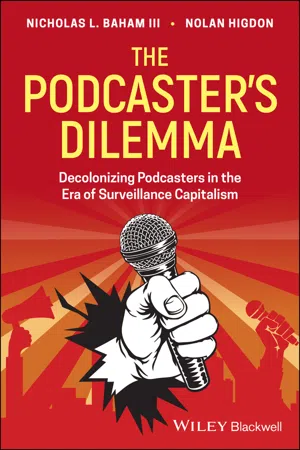In an article published in August 2020 in the e-zine Atalayar, which seeks to bridge communication and culture between Mediterranean and Atlantic leaders, Ana Rodriguez argues: “To speak of radio is to speak, as Ryszard Kapuscinky would say, of ‘that desire for our voice to reach somewhere that is a characteristic need of imprisoned people who cling like a plank of salvation to the world’s faith in justice, who are convinced that to be heard is to be understood and, therefore, to demonstrate the justice of their cause and to win it.’”1
The raison d’être of clandestine rebel radio remains the same for alternative voices in the existing landscape of podcasting. Political scientist Francis Fukuyama contends that the rise of identity politics should be understood as a reaction to the feeling of invisibility experienced among identity groups.2 The International Encyclopedia of Communication defines identity politics as “the struggle for political recognition by marginalized social groups based on particular affiliations of individual identity, such as gender, sexuality, ‘race,’ ethnicity, and nationality.”3 Podcasters use their positionality as outsiders to deconstruct the hegemonic structures that render them invisible.
This and other social justice imperatives of our surveyed podcasters reflect an enduring belief in the power of communication and in the persuasive power of truth-telling.4 The present survey of podcasting is being undertaken during a critical inflection point in American history, a moment when the fundamental assumptions about representative democracy are being openly challenged by demagoguery and power inequities, when American advancements in science are being undermined by false prophets, through half-baked distortions of liberty and myths of rugged individualism, and when virulent racism has been unmasked and amplified by a racist white nationalist head of state.5 We believe that, just as revolutionary radio broadcasts were products of their time, meeting the need of decolonizing struggles, podcasting answers the various needs of the early twenty-first century, and particularly the basic need for truth-telling in an era of mass media disinformation.
The rise of podcasting meets a specific historical need for a diversity of relevant, truthful, and reliable information sources. Where mass media and the Internet offer an often overwhelming and largely distorted information product,6 podcasters generally strive to provide targeted, contextualized, and relevant information for their audiences. It is important to understand that meaning is produced by our podcasters within a broader context of misinformation, disinformation, and hegemonic control.7 This is not a new problem for broadcasters who seek to disseminate a decolonizing message. Moorman notes: “The history of radio and state in Angola should remind us that the problems of fake news, bots, and infiltrated media ecosystems that make the headlines today have antecedents. They are also human problems that require human solutions.”8
Our examination of podcasts is centered on anticolonial content producers who were managing a maelstrom of political events set against the backdrop of COVID-19. Our voyage through this space revealed that the podcasters’ ability to “create” public opinion and serve as the centerpiece of communities of resistance may be even more critical in times of social conflict and transformation. Through her reading of the critical importance of the radio station The Voice of Fighting Algeria during the Algerian struggle for independence, Rodriguez insists:
Various studies on mass communication have shown that the media are a very effective instrument in the creation of public opinion; an opinion which – as a rule – tends to have very significant effects on society, even if there is no consensus on the nature and extent of these effects. This influence also depends on the more or less critical moments in society. As a rule, the media tend to be more influential in times of crisis.9
To better understand how these podcasters see themselves, we examined the keywords they chose to describe their podcasts. On most podcast-hosting websites, podcasters are asked to enter keywords as a way to help audiences determine whether the podcast covers the topics that they would be interested in. We looked at hundreds of keywords from the surveyed podcasts. The most common ones, in descending order, were “sex/sexism/sexuality,” “culture/cultural,” “LGBTQIA”; “gender”; “race/racism/multiracial,” “identity”; and “political/politics.” With much lower frequency, the next set of most common keywords, in descending order, included “personal (in terms of experience, perspective, and stories),” “feminism/feminist,” “economics/economy,” “inequality/inequity,” “love,” “relationship(s),” “empowerment,” “capitalism,” “emotional,” “government,” “intersectionality,” “lighthearted,” “non-binary,” “passion,” “poverty,” “safe space,” “slut/slut shaming,” “socialism,” and “society.” Interestingly, the word “decolonization” rarely appears; the few that list it among their keywords include From Hoodrat to Headwrap, which is described as “a Decolonized Podcast for lovers on the margins,”10 or the Red Nation and Eat the Rich podcasts, which focus respectively on “Indigenous history, politics, and culture from a left perspective” and the “political economy” and “late stage capitalism.”11
This chapter offers a critical analysis of the purpose, form, and style of many alternative voices in decolonial podcasting as well as an overview of the demographics of our surveyed podcasters. We also explore fundraising as a form of communication and community building. Throughout, we focus on how alternative voices in podcasting create public opinion, form counter-publics, and provide spaces for resistance, decolonization, and greater democratic access through the very purpose, form, and style they employ and through their fundraising.
Fundamental to the strategy of amplification and to the presumption of understanding is the way in which podcasts “create” public opinion about stories and issues intentionally marginalized by corporate mass media and, in so doing, either form or effectively rally a counter-public of formerly “imprisoned people.” For example, research has long discovered a class, race, gender, and nationalist bias that is endemic in corporate media sources.12 As a result, corporate news media may genuflect on issues of more equal representation, but frame policies discourses around a narrow set of ideological positions that maintain the status quo.13 This is not a result of technological innovation, but rather, as Marissa J. Moorman has argued, one of use: broadcasters use the available...
